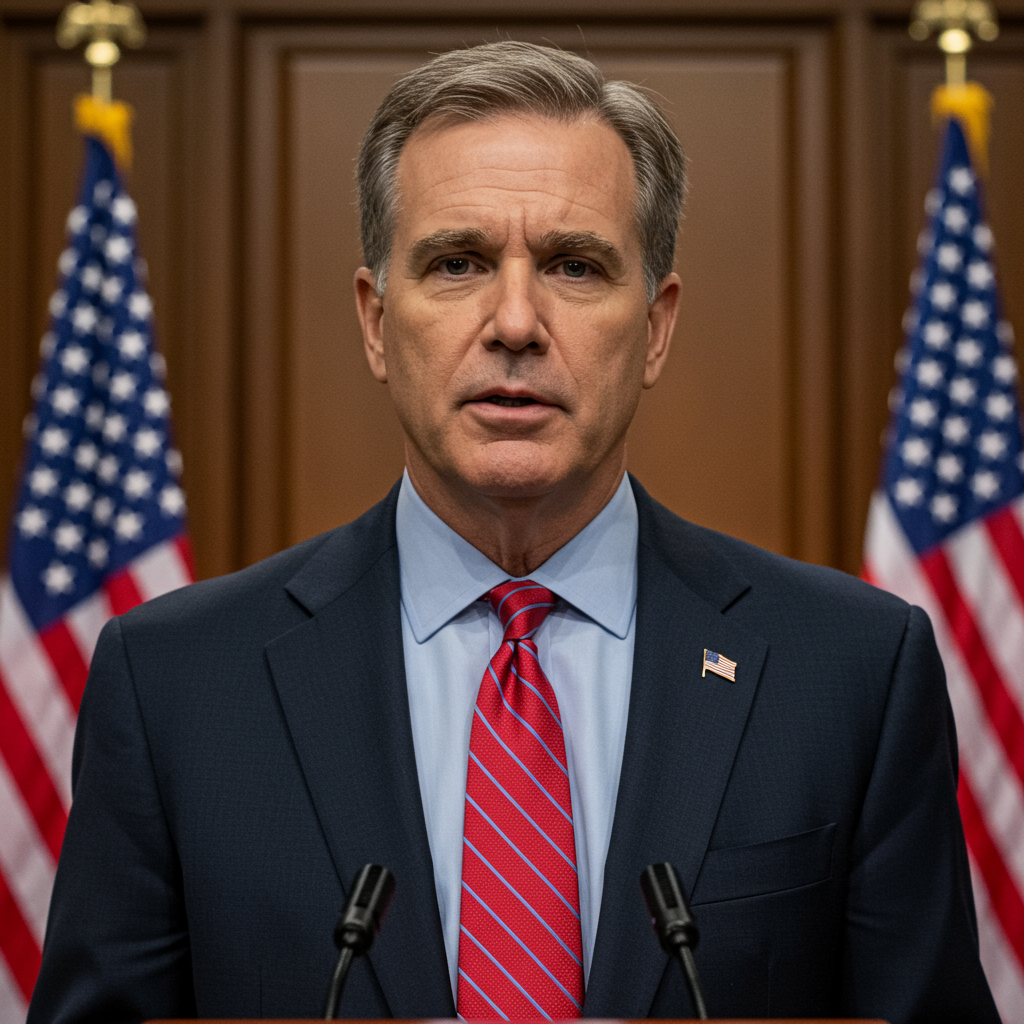In a move that immediately reshapes the political landscape of a key battleground state, north carolina Republican U.S. Senator Thom tillis announced Sunday he will not seek reelection in 2026. The decision, shared publicly on June 29, 2025, follows a period of heightened tension, particularly after Tillis opposed a major legislative package championed by former President Donald Trump just hours prior.
Tillis cited a blend of personal considerations and disillusionment with Washington’s increasing partisan gridlock as primary drivers for his choice. His departure opens up a U.S. Senate seat in a state that reliably hosts fiercely contested elections, setting the stage for what is now guaranteed to be one of the most watched races in the 2026 midterm cycle.
The Vote That Preceded the Announcement
Senator Tillis’s announcement came on the heels of a significant procedural vote in the Senate. Late Saturday, June 28, Tillis joined a minority of Republicans in voting against advancing a comprehensive domestic policy bill. This legislation, dubbed the “big, beautiful bill” by former President Trump, included significant tax changes and proposed spending cuts.
Tillis specifically objected to provisions within the bill that targeted healthcare programs, particularly Medicaid. He argued forcefully that these proposed cuts would be “devastating to North Carolina.” Speaking on the Senate floor, he stated that the bill betrayed a promise he believed President Trump had made: to focus on waste, fraud, and abuse in entitlement programs rather than making broad funding reductions impacting beneficiaries. A new analysis from the nonpartisan Congressional Budget Office (CBO) projected the Senate version of the bill could increase the number of uninsured Americans by 11.8 million by 2034, lending weight to Tillis’s concerns about the impact on access to care for hundreds of thousands of North Carolinians who recently gained Medicaid coverage.
Direct Conflict with Former President Trump
Tillis’s vote drew swift and public condemnation from former President Trump. In a series of late-night posts on social media, Trump praised other Republican senators who supported the bill while singling out Tillis for opposition. Trump called Tillis’s vote a “BIG MISTAKE” and, notably, threatened to meet with potential primary challengers, indicating he would search for someone to “properly represent the Great People of North Carolina.”
The timing of Tillis’s announcement, occurring just hours after Trump’s public threat, highlights the challenging environment for Republican lawmakers who deviate from the former president’s stance. While sources close to Tillis indicated he had been leaning towards retirement for some time, weighing factors like campaign independence and party leader support, the combination of GOP leadership proceeding with the Medicaid cuts and Trump’s explicit call for a primary challenger on Truth Social solidified his decision. Tillis reportedly informed both Trump and Senate Majority Leader John Thune of his plans Saturday night, before Trump’s critical posts. Following Tillis’s public announcement, Trump simply posted “Great News!”, further underscoring the political friction.
More Than Just One Vote: A Reflection on Modern Politics
In his statement announcing his decision, Tillis offered a broader perspective on the state of politics in Washington, D.C. He noted that leaders willing to embrace bipartisanship, compromise, and independent thinking are becoming “an endangered species.”
Tillis expressed pride in his career but acknowledged the difficulties faced by those who prioritize functional governance over strict party adherence. He referenced former Senators Joe Manchin and Kyrsten Sinema, who also chose not to seek reelection after serving as key swing votes. Tillis argued these independent thinkers were effective but often “shunned” within their own parties, particularly for actions like refusing to eliminate the filibuster. He highlighted what he sees as a hypocrisy in American politics: independent thought is cheered when it comes from the opposition but scorned and ostracized when it comes from one’s own side. He stated he looked forward to serving the remainder of his term with the “pure freedom to call the balls and strikes as I see fit” for North Carolina, unburdened by fundraising or campaigning.
Remaking the 2026 North Carolina Senate Race
Thom Tillis’s retirement instantly transforms what was already anticipated to be a highly competitive contest for his seat. North Carolina is a crucial battleground state, narrowly decided in presidential and statewide elections.
For Republicans, Tillis’s departure presents both a challenge and a potential opportunity. While losing an incumbent with statewide experience is difficult, Tillis had drawn criticism from some within his own party, leading to a censure from North Carolina Republicans in 2023 over various issues. Some experts suggest his departure could allow the party to unify behind a new candidate less divisive among hardline conservatives. National Republican leaders, including NRSC Chairman Tim Scott, quickly expressed confidence that the GOP would successfully defend the seat, citing President Trump’s three victories in the state and its recent history of electing Republican senators.
Democrats, however, are significantly more optimistic about their prospects with Tillis out of the picture. They view the seat as one of their strongest opportunities to flip control of a Senate seat in 2026. Democrats believe the Republican party’s stance on issues like the proposed Medicaid cuts makes the seat vulnerable. Former Congressman Wiley Nickel has already declared his intention to run, expressing confidence in his ability to win. Additionally, former Democratic Governor Roy Cooper is reportedly in the “active consideration phase” regarding a potential bid and is expected to make a decision soon.
Potential Candidates Emerge
The void left by Tillis’s decision has immediately sparked speculation about potential successors. On the Republican side, a large field of potential candidates is already being discussed within GOP circles. Prominent names include Lara Trump, former RNC co-chair and President Trump’s daughter-in-law, who is reportedly giving a run strong consideration.
Other potential GOP contenders mentioned are RNC Chairman Michael Whatley, a former head of the North Carolina GOP, and Rep. Richard Hudson, who leads the House Republicans’ campaign arm. Several freshman Republican congressmen from North Carolina could also enter the race, including Reps. Pat Harrigan, Tim Moore, and Brad Knott. The primary battle to watch will likely center on who can best coalesce support within the party, particularly appealing to the significant portion of the base loyal to Donald Trump.
Tillis’s Legacy and Looking Ahead
First elected to the U.S. Senate in 2014, Thom Tillis previously served as Speaker of the North Carolina House, where he played a key role in ushering in Republican majorities in 2010 and implementing conservative policies. As a U.S. Senator, he has often been seen as a moderate Republican willing to work across the aisle on issues like mental health, substance abuse recovery, Medicaid expansion, and veterans’ support. While these bipartisan efforts sometimes drew criticism from within his party, Tillis has stated he would not change any of them. His willingness to occasionally break with his party, culminating in the high-profile vote against a key Trump-backed bill, ultimately defined his final public stand before announcing his retirement.
The race to succeed Senator Tillis is now officially underway. With a crowded field of potential candidates on both sides, significant national attention and resources will pour into North Carolina, making the 2026 Senate election a critical test of the state’s political alignment and the national parties’ strategies.
Frequently Asked Questions
Why did Senator Thom Tillis announce his retirement from the Senate?
Senator Thom Tillis stated his decision not to seek re-election in 2026 was primarily due to a lack of enthusiasm for serving another term amidst the “political theatre and partisan gridlock” in Washington, D.C. He framed it as a choice between that environment and spending time with his family. The announcement closely followed his vote against a major Trump-backed bill containing Medicaid cuts, which he argued would harm North Carolina, intensifying existing tensions within the Republican party regarding dissent from former President Trump’s agenda.
How does Senator Tillis’s retirement affect the 2026 Senate race in North Carolina?
Thom Tillis’s retirement significantly alters the 2026 election landscape in North Carolina. It transforms what would have been a challenging re-election bid for an incumbent into an open seat contest in a crucial battleground state. This makes the race a top target for both Republican and Democratic parties nationally. Republicans will likely face a competitive primary among several potential candidates, while Democrats see a prime opportunity to flip the seat, with prominent figures like former Governor Roy Cooper potentially entering the race against declared candidate Wiley Nickel.
What policy did Senator Tillis oppose leading up to his retirement announcement?
Just hours before announcing his retirement, Senator Tillis voted against advancing a comprehensive domestic policy bill favored by former President Donald Trump. His opposition centered on proposed cuts to Medicaid within the legislation. Tillis argued these cuts would be detrimental to North Carolina residents and hospitals, stating they would violate promises made by Donald Trump regarding protecting entitlement programs and could lead to hundreds of thousands losing healthcare coverage, citing analysis from the Congressional Budget Office.



